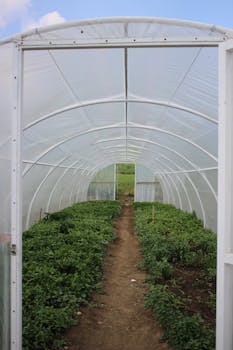The future of agricultural communities in the United States is an essential topic as we collectively face environmental, economic, and technological challenges. Agricultural communities are the backbone of food production, providing sustenance not only for the nation but also for the world. As we advance further into the 21st century, it becomes increasingly critical to address how these communities can evolve and thrive amidst change.
With advancements in technology and a growing focus on sustainability, the agricultural sector can move toward innovative practices. At the same time, pressing issues such as climate change and the economy present multifaceted challenges that farmers and agricultural communities must address. Balancing tradition with modern techniques is vital for enhancing productivity while ensuring environmental stewardship.
The goal of this article is to explore the future of agricultural communities in the United States, focusing on technological innovations, sustainable practices, economic challenges, and community resilience. Each of these aspects plays a critical role in shaping the agricultural landscape of tomorrow.
Technological Innovations in Agriculture
Technology is reshaping agriculture in unprecedented ways, making farming more efficient and productive. From drones to GPS-guided equipment, these innovations are revolutionizing farming practices. Precision agriculture allows farmers to monitor and manage their crops with incredible accuracy, reducing waste.
This technological shift enhances crop yields while minimizing resource use, including water and fertilizers. Furthermore, advanced data analytics empowers farmers to make informed decisions based on real-time information. Crop health monitoring systems contribute significantly to timely interventions, which can prevent losses.
Additionally, automation is becoming increasingly prevalent in agriculture. Robotics and automated machinery are streamlining labor-intensive tasks like harvesting. This shift not only boosts efficiency but also addresses labor shortages, a challenge many agricultural communities face.
Moreover, biotechnology is playing a considerable role in developing resilient crop varieties. Genetically modified organisms (GMOs) boast traits like drought resistance and pest tolerance, making them crucial in adapting to changing climatic conditions. Thus, the integration of technology into agriculture can lead to sustainable growth.
Ultimately, technological advancements in agriculture create a promising outlook for the industry. With careful implementation and regulation, these innovations can lead to a more robust agricultural community well-prepared for future challenges.
Sustainable Farming Practices
Sustainability is a crucial aspect of modern agriculture, incorporating practices that protect the environment while ensuring food security. Sustainable farming focuses on maintaining ecological balance and using resources responsibly. This philosophy is gaining traction among farmers and consumers alike.
Crop rotation is a time-tested sustainable practice that enhances soil health and biodiversity. By alternating crops, farmers can naturally replenish soil nutrients and reduce pest populations. Additionally, cover cropping aids in preventing soil erosion and improving fertility, further promoting sustainability.
Conservation tillage is another effective method that minimizes soil disturbance. This technique not only preserves soil structure but also captures moisture, reducing the need for irrigation. Ultimately, these practices contribute to healthier ecosystems and increased resilience against extreme weather conditions.
Furthermore, organic farming emphasizes the use of natural fertilizers and pest management strategies. This approach not only benefits the environment but also appeals to consumers seeking chemical-free food options. Consequently, organic farming presents market opportunities for farmers committed to sustainability.
Incorporating sustainable practices ensures agricultural communities can thrive while mitigating their environmental impact. The commitment to sustainability represents a valuable investment in the future of both farmers and consumers.
Economic Challenges in Agriculture
The agricultural sector faces numerous economic challenges that can hinder the growth of farming communities. Fluctuating market prices significantly impact farmers’ income, making it difficult for them to plan and invest in their operations. Understanding these economic factors is keystone for future viability.
Global competition further compounds these challenges as local farmers compete against imported goods. Price wars can reduce profit margins, forcing many small farms to shut down. Farmer cooperatives, however, can offer a viable solution by pooling resources and marketing products collectively to mitigate risks.
Additionally, access to capital remains a barrier for many farmers trying to adopt new technologies or sustainable practices. Limited financing options or high interest rates can inhibit necessary investments. Innovative financing models, such as community-supported agriculture (CSA), can offer alternative funding avenues.
The rising costs of inputs, such as seeds, fertilizers, and labor, also strain farmers’ budgets. Therefore, innovative strategies for cost efficiencies are essential for maintaining healthy operations. Collaboration with educational institutions can provide farmers with the necessary training and resources.
Despite the challenges, resilience is integral to agricultural communities. By understanding and overcoming economic barriers, these communities can adjust and thrive for future generations.
Climate Change and Its Impact
Climate change poses significant threats to agricultural communities across the United States. Increasing temperatures, erratic weather patterns, and severe droughts challenge traditional farming practices. Understanding these impacts is vital for ensuring the long-term viability of agriculture.
In many regions, rising temperatures contribute to altered growing seasons, affecting crop yields and harvest times. Farmers may need to adapt by switching to more resilient crop varieties or altering their planting schedules. Therefore, research and development are critical in this effort.
Moreover, extreme weather events, including floods and hurricanes, can devastatingly impact farming infrastructure. Crop losses from erratic weather can lead to financial strain, making effective disaster preparedness essential for communities. Building resilience through infrastructure improvements helps mitigate climate risks.
Furthermore, shifting precipitation patterns can result in water scarcity or flooding, complicating irrigation practices. Implementing water conservation techniques, like drip irrigation, can help manage and optimize water usage. Overall, proactive measures must be adopted to counter these climate challenges.
By recognizing the implications of climate change, agricultural communities can develop strategies to safeguard their future. Collaborative approaches involving local, state, and federal governments will be essential for fostering resilience against climate-related challenges.
Community Resilience and Support
Community resilience is critical in adapting to change and promoting growth among agricultural communities. A strong support network enables farmers to face challenges collectively, reinforcing their economic and social stability. Building such networks can foster collaboration and innovation within communities.
Local organizations and cooperatives often play a pivotal role in this support system. By providing resources, training, and market access, they empower farmers to make informed decisions. Additionally, mentorship programs can connect experienced farmers with newcomers, ensuring knowledge transfer across generations.
Moreover, community gardens and farmers’ markets promote local produce, enhancing food security and community engagement. These initiatives foster stronger relationships among residents while supporting local economies. Thus, community-driven efforts can stimulate growth and resilience.
Advocacy is also vital in influencing agricultural policy that benefits local farms. As community members unite, they can address issues like land conservation, water rights, and fair pricing. Collective voices can lead to impactful changes at local and national levels.
Ultimately, community resilience fosters a sense of belonging and shared responsibility among agricultural stakeholders. This collaborative spirit will be essential for navigating future challenges and promoting sustainable growth.
The Role of Education and Research
Education and research play vital roles in empowering agricultural communities to adapt to future challenges. By equipping farmers with the latest knowledge and best practices, these efforts enhance productivity and sustainability. Ultimately, continuous learning is crucial for the agricultural sector to thrive.
Universities and research institutions focus on advancements in agriculture, providing vital resources for farmers. Through collaborative efforts, innovative practices can be developed and implemented at the local level. These educational initiatives ensure that farmers stay informed about emerging trends and technologies.
Workshops, training programs, and online courses offer farmers opportunities to develop new skills. Topics like sustainable practices, marketing strategies, and financial management are essential for success. By investing in education, communities can build their capacity to face challenges more effectively.
Moreover, farm demonstrations and field days allow farmers to observe and adopt new techniques firsthand. These practical experiences foster knowledge-sharing and encourage collaboration among community members. Thus, hands-on learning contributes significantly to improving agricultural practices.
Investing in education and research promotes innovation in agricultural communities, paving the way for a sustainable future. As knowledge grows, so does the capacity to adapt to changing conditions, ensuring continued success.
Conclusion
The future of agricultural communities is inextricably linked to innovation, sustainability, and resilience. By embracing technological advancements and sustainable practices, farmers can enhance productivity while conserving resources. Community support and education will play pivotal roles in navigating economic challenges and environmental changes.
Through collaboration and a shared commitment to progress, agricultural communities can build resilience and adapt to future challenges. Collective efforts to improve skills and leverage resources will empower farmers to succeed. As we move toward a more sustainable and prosperous future, the potential is vast.
Ultimately, the ongoing evolution of agriculture depends on the commitment of stakeholders at all levels. Embracing innovation, sustainability, and community building will ensure a vibrant agricultural sector for generations to come.
| Innovation Type | Description | Benefits |
|---|---|---|
| Precision Agriculture | Technology-driven farming practices that enhance crop management. | Increased efficiency and reduced resource waste. |
| Robotics | Automated machinery for labor-intensive tasks. | Improved efficiency and productivity. |
| Organic Farming | Utilizing organic methods for crop cultivation. | Enhanced consumer trust and environmental benefits. |
| Community Support | Collaboration among local farmers for shared resources. | Strengthened local economies and resilience. |
- Technological advancements in agriculture
- Importance of sustainable practices
- Economic challenges faced by farmers
- Impact of climate change on agriculture
- Community resilience and support networks


